#labor policy
Text
« Donald Trump is a scab. Donald Trump is a billionaire, and that’s who he represents.
If Donald Trump ever worked in an auto plant, he wouldn’t be a UAW member. He’d be a company man, trying to squeeze the American autoworker. »
— Shawn Fain, President of the United Auto Workers, in his endorsement of Joe Biden on Wednesday. Via MLive.com in Michigan.
During the 2023 UAW strike, Joe Biden became the first president to walk a picket line. Around the same time, Donald Trump gave a self-serving speech at a non-union shop.
The Biden administration has seen a rise in successful trade unionism. The Trump administration was a time of giving huge tax breaks to billionaires while removing protections from workers.
8 Ways the Biden Administration Has Fought for Working People by Strengthening Unions
#uaw#united auto workers#shawn fain#endorsement of joe biden#workers rights#unions#a living wage#labor policy#trump is a scab#republican are union busters#vote blue no matter who#election 2024
3 notes
·
View notes
Text
I'm very proud of Illinois for mandating 40 hours of paid time off for employees annually.
To the business owners bulking that this will hurt your business - if you cannot provide a maximum of 5 days of paid leave for your employees that you profit off of, you're not running a successful business. You should close your doors and get a real job. See what it's like to not set your own hours and not be able to take time off when you need to.
2 notes
·
View notes
Text
Apple workers in Oklahoma vote to unionize in 2nd labor win
Apple workers in Oklahoma vote to unionize in 2nd labor win
NEW YORK — Workers at an Apple store in Oklahoma City voted to unionize, marking the second unionized Apple store in the U.S. in a matter of months, according to the federal labor board.
The vote on Friday signaled another win for the labor movement, which has been gaining momentum since the pandemic.
Fifty-six workers at the store, located at Oklahoma City’s Penn Square Mall, voted to be…
View On WordPress
#Business#coronavirus#Diseases and conditions#Economy#Government and politics#Government policy#Health#infectious diseases#Labor economy#Labor issues#Labor policy#Lung disease#Political issues#Political movements#Social affa#Workers&x27; rights
0 notes
Text

#republicans#conservatives#us politics#memes#shitpost#conservatives be like#republicans be like#gop policy#gop platform#gop#republican family values#republican homophobia#child marriage#child labor laws#libertarians be like#fuck libertarians#libertarian#libertarians
2K notes
·
View notes
Text
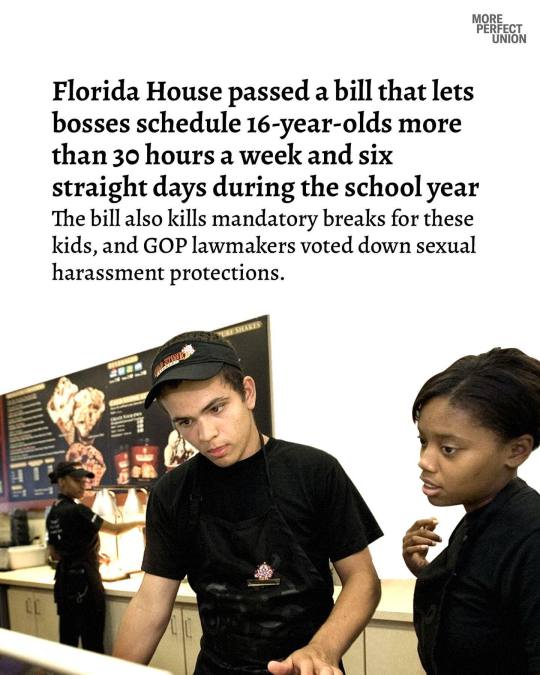


i guess we're starting to see why the gop want to outlaw abortion smfh
#politics#gop#child labor#child labor laws#conservative fuckery#captialism#florida#republicans#smfh#child protections#GOP florida#child rights#child welfare#child labor GOP#child protection rollback#florida politics#child safety#GOP policy#child exploitation#labor regulations#GOP agenda#child welfare rollback#child labor debate#florida legislation#GOP priorities
249 notes
·
View notes
Note
Which federal laws and policies would you get rid of or modify in order to help the American labor movement.
I was looking through the labor law tag on my blog and your ask reminded me I haven't actually written a comprehensive post about this on Tumblr. (Indeed, you'd have to go back to my old, old policy blog from 2009...it's been a while.)
One silver lining of the Sisyphean struggle to restore American labor law that's been going on since the 1970s is that the labor movement and their allies in Congress, academia, think tanks, and progressive media have been thinking through this very issue of "what reforms would make a real difference" for a long time. I'm not going to say it's a solved question, but the research literature is pretty robust.

For the purposes of this post, I'm going to focus on the three most recent reform packages: the Employee Free Choice Act that was the main vehicle during the Obama years, Bernie Sanders' Workplace Democracy Act (which was introduced repeatedly between 1992 and 2018), and the Richard L. Trumka Protecting the Right to Organize Act (PRO Act) that is the current proposal of the Democratic legislative caucuses. There's going to be quite a bit of overlap between these proposals, because it's very much an iterative process where allies in the same movement are trading ideas with one another and trying to stay abreast of new developments, but I'll try to tease out some of the similarities and differences.
EFCA
While EFCA contained a number of provisions that sought to close various loopholes in U.S labor law, the three main provisions largely target the flaws that have made it extremely difficult to win a union through the National Labor Relations Act process devised in 1935 that has turned into a Saw-style gauntlet thanks to the professionalization of union-busting and the Federalist Society's strategy of death-by-a-thousand-cuts:
"Card check." Probably the most common pattern of union-busting in the workplace today is a war of attrition by management waged by an industry of specialized law firms. Generally what happens is that the union files for election with a super-majority of ~70% workers having signed union cards, then management delays the vote as long as possible to give their hired "union-avoidance" firm to systematically intimidate, surveil, propagandize, and divide workers, up to and including illegally firing pro-union workers pour encouragez les autres. Over several months, what happens is that the initial 70% of pro-union support starts to erode as workers decide it's just too dangerous to stick their necks out, until the vote happens and the union loses either by a squeaker or a landslide.
Card check short-circuits this process by just saying that if the union files with a majority of cards, you skip the election and the union is recognized. And for all the pearl-clutching by the right, this is actually how labor law works in many democratic countries, because the idea of a fair election that lets management participate is an oxymoron.
Arbitrated first contract. In the event that enough workers keep the faith and actually vote for a union, management's next move is to draw out collective bargaining for a year or more. After a year, the original vote is no longer considered binding and employers can push for a "decertification" vote, which they usually win because workers either give up hope or change jobs. So this provision says that if the two sides can't reach an agreement on a first contract within 120 days, a Federal arbitrator will just impose one, so that at least for two years there will be a union contract no matter what management wants.
Strengthening enforcement. As I said above, one of the problems with existing labor law is that there are basically no penalties for management knowingly breaking the law; companies literally just budget in a line-item and do it anyway. This provision would allow unions to file an injunction against employers for unfair labor practices or ULPs (at present, injunctions are only required for violations done by unions), and would add triple back pay for illegal firings and fines of $20,000 for each ULP. This would make union-busting much more expensive, because companies routinely rack up hundreds and hundreds of them during a campaign.
Workplace Democracy Act
Sanders' proposal includes the main proposals from EFCA, and adds a bunch of additional reforms, like mis-classifying workers as independent contractors, banning captive audience meetings, making "joint employers" liable for labor law violations by franchisees, legalizing secondary boycotts, and requiring employers to report to the NLRB on all anti-union expenditures during a campaign and barring anyone convicted of an unfair labor practice from being hired for anti-union campaigns and making "union-avoidance" consultants liable for fines for ULPs (which would kill the "union-avoidance" industry, because they commit ULPs for a living).
PRO Act
The PRO Act is very much an updating of the previous efforts we've talked about. It bans captive audience meetings, allows for secondary strikes and boycotts, massively increases fines and allows for compensatory damages, ends mis-classification, speeds up the election process, etc.
It also contains a couple new and ambitious proposals:
it allows unions to sue management in court instead of having to complain to the NLRB, which opens management up to a very expensive legal proceeding and discovery.
it bans "right-to-work" as established by the Taft-Hartley Act.
it requires that any worker who's fired for pro-union activity be immediately reinstated while their unfair labor practice process or civil lawsuit is going through the process. This would be enormous just on its own, because it changes the entire veto structure of illegal firing. As it stands, employers fire people and maybe maybe have to pay some back wages in a couple years when the worker has found another job and is unlikely to come back. This would reverse the balance of power, such that the worker is immediately back and other workers can see that they can speak up without getting fired, which makes illegal firings a giant waste of time and money for management.
In terms of stuff that's not on this list that I would add, I would say that an enormous difference could be made by simply making it illegal for management to lock-out their workers or hire scabs. You do that, and unions can win almost every strike.
75 notes
·
View notes
Text
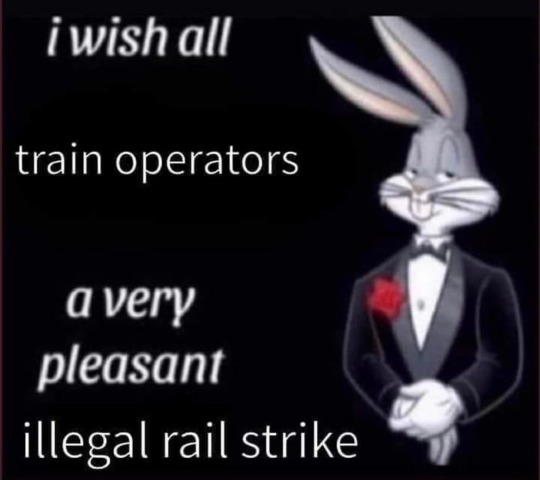
hot tips, if there happens to be a strike.
1. buy gas and keep your tanks full. Crude oil is one of the main commodities shipped via rail, and prices will shoot up after labor unrest.
2. commuter railroads will shut down, also increasing gas prices and worsening traffic.
3. Trucking capacity will dry up in the US, so the vast majority of consumer goods being shipped over the road will experience significant delays. Get those Christmas gifts rn
The important thing to remember is that the rail strike will have significant long-term impacts, and the true impact will not necessarily be felt in the immediate aftermath. while it may seem unimportant now, this will have a monumental impact on the US economy and send the US further into a recession.
Prepare, but remember that it doesn’t have to be this way if we support our workers and advocate for a fair and just labor movement.
#strike#general labor issues#anti capitalism#anti work#long reads#communism#politics#government policy#rail strike#current events#meme#funny#advocate#twitter#elon musk#economy#economics#an embarrassing amount of tags because o think this is important
447 notes
·
View notes
Text
In a week when parts of the state are getting triple-digit temperatures and weather officials urge Texans to stay cool and hydrated, Gov. Greg Abbott gave final approval to a law that will eliminate local rules mandating water breaks for construction workers.
House Bill 2127 was passed by the Texas Legislature during this year’s regular legislative session. Abbott signed it Tuesday. It will go into effect on Sept. 1.
Supporters of the law have said it will eliminate a patchwork of local ordinances across the state that bog down businesses. The law’s scope is broad but ordinances that establish minimum breaks in the workplace are one of the explicit targets. The law will nullify ordinances enacted by Austin in 2010 and Dallas in 2015 that established 10-minute breaks every four hours so that construction workers can drink water and protect themselves from the sun. It also prevents other cities from passing such rules in the future. San Antonio has been considering a similar ordinance.
Texas is the state where the most workers die from high temperatures, government data shows. At least 42 workers died in Texas between 2011 and 2021 from environmental heat exposure, according to the U.S. Bureau of Labor Statistics. Workers’ unions claim this data doesn’t fully reflect the magnitude of the problem because heat-related deaths are often recorded under a different primary cause of injury.
This problem particularly affects Latinos because they represent six out of every 10 construction workers, according to U.S. Census Bureau data.
Unions expect heat-related deaths to go up if mandated water breaks go away.
“Construction is a deadly industry. Whatever the minimum protection is, it can save a life. We are talking about a human right,” said Ana Gonzalez, deputy director of policy and politics at the Texas AFL-CIO. “We will see more deaths, especially in Texas’ high temperatures.”
The National Weather Service is forecasting highs over 100 degrees in several Texas cities for at least the next seven days.
Heat waves are extreme weather events, often more dangerous than tornadoes, severe thunderstorms or floods. High temperatures kill people, and not just in the workplace. Last year, there were 279 heat-related deaths in Texas, based on data analysis by The Texas Tribune.
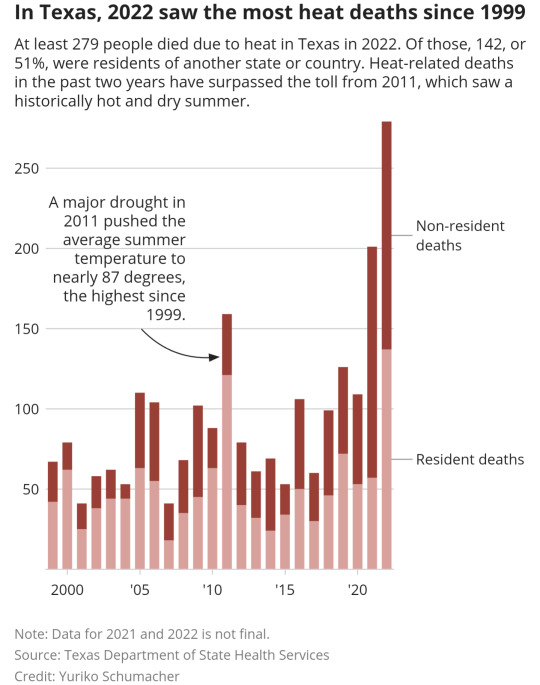
In 2022, Texas saw its second-hottest summer on record, and an extreme drought swept the state. This summer is not expected to be as hot as the weather pattern known as La Niña eases, which typically brings dry conditions to Texas, state climatologist John Nielsen-Gammon said.
Still, climate change amplifies the effects of heat waves, said Hosmay Lopez, an oceanographer at the National Oceanic and Atmospheric Administration who studies heat waves. Climate change causes heat waves to stretch for longer periods of time, reach higher temperatures and occur more often than they would otherwise. The problem is especially pronounced in dry areas of the Southwest due to a lack of vegetation and soil moisture, which in wetter regions produces a cooling effect through evaporation.
At the same time, he added, increased urbanization across the U.S. — especially in places like Texas where cities are expanding — makes more people vulnerable to health dangers from extreme heat due to the “urban island” effect. Essentially, the combination of concrete and buildings, plus a lack of green spaces causes ground-level heat to radiate, increasing the temperature in cities.
“The impact of climate change on extreme heat is not only enhanced [by weather events] but also enhanced through social dynamics as well,” Lopez said.
HB 2127, introduced by state Rep. Dustin Burrows, R-Lubbock, is perhaps Texas Republicans’ most aggressive attempt to curb progressive policies in the state’s largest, liberal-leaning cities. Under the new law, local governments would be unable to create rules that go beyond what state law dictates in broad areas like labor, agriculture, business and natural resources.
Beyond eliminating mandated water breaks for construction workers, opponents of the legislation argue that it will also make it more difficult for cities and counties to protect tenants facing eviction or to combat predatory lending, excessive noise and invasive species. Labor unions and workers’ rights advocates opposed the law, while business organizations supported it, including the National Federation of Independent Business, a lobbying group with more than 20,000 members in Texas. Abbott said it would “provide a new hope to Texas businesses struggling under burdensome local regulations.”
Supporters of HB 2127 say that local regulations on breaks for construction workers are unnecessary because the right to a safe labor environment is already guaranteed through the Occupational Safety and Health Administration.
Water breaks are better solved by OSHA controls, argued Geoffrey Tahuahua, president of Associated Builders and Contractors of Texas. Tahuahua believes local rules impose a rigid scheme that, unlike OSHA guidelines, does not allow the flexibility needed to tailor breaks to individual job site conditions.
“They try to make one size fits all, and that is not how it should work,” he said. “These ordinances just add confusion and encourage people to do the minimum instead of doing the right thing.”
David Michaels, who was head of OSHA from 2009 to 2017, disagreed with the approach of HB 2127 proponents.
“Under OSHA law, it is employers who are responsible to make sure workers are safe,” said Michaels, now a professor at the George Washington University School of Public Health. “And we have compelling evidence that they are doing a very poor job because many workers are injured on the job, especially in Texas.”
Michaels pointed out that OSHA does not have a national standard for heat-related illnesses and issues citations only for over-exposure to heat after an injury or death, but not before that occurs.
“The better solution would be to have a national standard, but since we do not, local ordinances are very important for saving lives,” he said. “Prohibiting these local laws will result in workers being severely hurt or killed.”
Gonzalez, from the Texas AFL-CIO, disagrees with the idea that local regulations hurt businesses.
Mandated water breaks “were passed in 2010 in Austin and construction is still growing, especially in the state’s largest cities,” Gonzalez said. “It is simply false, an excuse to limit local governments’ power and an intrusion into democracy.”
HB 2127 does not impede the enactment of a state law establishing mandatory breaks for construction workers, and during the regular session, two bills were filed to that effect.
House Bill 495, authored by Rep. Thresa Meza, D-Irving, sought to establish 10-minute mandatory breaks every four hours for contractors working for a governmental entity. House Bill 4673, by Rep. Maria Luisa Flores, D-Austin, would have created a statewide advisory board responsible for establishing standards to prevent heat illness in Texas workplaces and set penalties for employers who do not comply with them.
Neither bill made it through the legislative process.
Daniela Hernandez, state legislative coordinator for the Workers Defense Project, said she hopes legislators will push for a state law mandating water breaks for workers. She added that she would not discard the possibility that cities sue to try to keep their water break ordinances.
“Without an ordinance or a law, there is no safeguard. There is no guarantee that the worker will have those water breaks,” he said. “We will keep fighting.”
#us politics#news#the texas tribune#2023#texas#gov. greg abbott#republicans#conservatives#gop policy#gop platform#gop#House Bill 2127#Texas Legislature#heat wave#U.S. Bureau of Labor Statistics#worker's rights#union workers#Texas AFL-CIO#Ana Gonzalez#National Oceanic and Atmospheric Administration#Dustin Burrows#National Federation of Independent Business#Occupational Safety and Health Administration#Associated Builders and Contractors of Texas#Mandated water breaks#House Bill 495#House Bill 4673#Thresa Meza#Maria Luisa Flores#Workers Defense Project
54 notes
·
View notes
Text
The AP found that U.S. prison labor is in the supply chains of goods being shipped all over the world via multinational companies, including to countries that have been slapped with import bans by Washington in recent years. For instance, the U.S. has blocked shipments of cotton coming from China, a top manufacturer of popular clothing brands, because it was produced by forced or prison labor. But crops harvested by U.S. prisoners have entered the supply chains of companies that export to China.
While prison labor seeps into the supply chains of some companies through third-party suppliers without them knowing, others buy direct. Mammoth commodity traders that are essential to feeding the globe like Cargill, Bunge, Louis Dreyfus, Archer Daniels Midland and Consolidated Grain and Barge – which together post annual revenues of more than $400 billion – have in recent years scooped up millions of dollars’ worth of soy, corn and wheat straight from prisons, which compete with local farmers.
...Incarceration was used not just for punishment or rehabilitation but for profit. A law passed a few years [after the formal end of the convict-leasing system in 1928] made it illegal to knowingly transport or sell goods made by incarcerated workers across state lines, though an exception was made for agricultural products. Today, after years of efforts by lawmakers and businesses, corporations are setting up joint ventures with corrections agencies, enabling them to sell almost anything nationwide.
Civilian workers are guaranteed basic rights and protections by OSHA and laws like the Fair Labor Standards Act, but prisoners, who are often not legally considered employees, are denied many of those entitlements and cannot protest or form unions.
“They may be doing the exact same work as people who are not incarcerated, but they don’t have the training, they don’t have the experience, they don’t have the protective equipment,” said Jennifer Turner, lead author of a 2022 American Civil Liberties Union report on prison labor.
#this whole article is good read the whole thing#it's extremely important that reporters & activists continue to bring to light the horrific abuses of prison labor#& that we all understand that none of this is new - angola / louisiana state prison is immense & has a vast bloody history#the largest agricultural producer in the state of texas in the 60s was the department of corrections#& as this article points out a rising reliance on incarcerated labor is one response#to the labor shortages caused by unchecked covid deaths + restrictive immigration policy#the whole of american incarceration & labor policy is evil. blood on the leaves & blood at the root
9 notes
·
View notes
Text
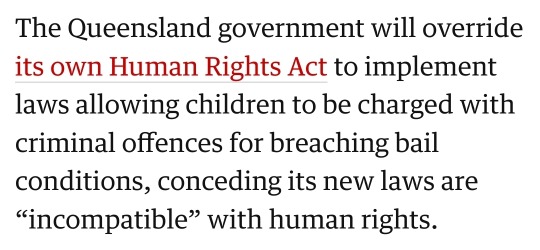
well this is chilling.
#auspol#palaszczuk when the laws are incompatible with human rights that's a big flashing neon sign saying do not pass go! do not pass this bill!!#this is from the labor party for any interstate or international mutuals/followers. our 'centre-left' party#the opposition announced this as a policy a few days ago#qldpol
61 notes
·
View notes
Text
how to make 19 year old boy who came of age during the pandemic and never had a real real job before now realize he needs to Chill The Fuck Out and be Less eagar about working for free holy shit he is impossible to wrangle
#moki talks#hi i got dumped with a shitload of new responsibilities at work#one of which includes trying to teach a Virgin Employee how work life.. works#today i got asked a mindfuckery question that made me go#oh oh no he doesn't even know basic labor laws must get him sat down with hr like yesterday#do you wanna know what the question was#'so if you work more than 8 hours are you like required to take a lunch??'#CHILD PLEASE#i have told him no less than SIX times now to STOP. WORKING. OFF. THE. CLOCK. jesus christ#it is a CHALLENGE when this is all in a remote environment#sigh. i am not cut out for teaching kids#lawd i am trying tho#i guess in his defense there aren't labor law posters plastered everywhere to read during breaks/downtime#as there are in the typical workplace environment#idk man he's a good kid very smart tons of initiative but i have a feeling this aint the job for him#which really sucks cause its basically his dream job but#bruh i need you to get like 3-6 months minimum of real people customer service job skills#smh i am flabbergasted he asked me about the break policy he has 0 concept of the severity of labor laws#like no wonder states are pushing for child labor again NO ONE IS EDUCATING THESE KIDS ABOUT THEIR RIGHTS. FUCK.
8 notes
·
View notes
Text
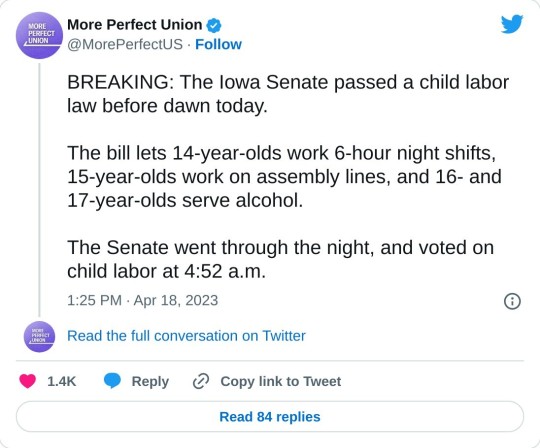
#us politics#news#twitter#tweet#republicans#conservatives#gop#gop policy#gop platform#republican family values#more perfect union#iowa#iowa senate#child labor#child labor laws#worker's rights#working class#working class history#working class solidarity#night shifts#assembly lines#alcohol#alcohol servers#alcohol sellers#bartending#2023
954 notes
·
View notes
Text
`
#asks are off for now just until i can catch a break#i might need to institute a blog policy#about asking for help boosting donation posts#normally i don’t mind but im just getting such a large influx in messages like its 90% of the asks i receive#its overwhelming#like i just don’t think im in a good enough space right now to be constantly getting messages about how shitty everyone;s situation is rn#im barely making ends meet myself and the art business is not exactly booming. im going to lose my insurance in january and i dont qualify#for ssi so i just really can;t handle al the extra reminders atm#and not to pull the ‘’emotional labor’’ card but yeah i don’t have any extra energy to lend to strangers online. im sorry it sucks. genuinel#i know how you feel. we’re all in the shitstorm so it feels especially bad not being able to help#but please can you find someone else on this site who is not drowning to throw you a life raft
33 notes
·
View notes
Text
off the record but my assistant manager is pissing me the fuck off
#first you try to make a policy that’s a fucking labor law violation#now you’re explaining to ME how to do MY job??? i’ve been here for 2 fucking years i am an adult#and you think i don’t know how to add 7 numbers
6 notes
·
View notes
Note
Sorry if this is a stupid question, but how does back to work legislation usually work? Can a piece of legislation force the union and management to sign a contract that one or both of them don’t agree with?
So if you're referring to something like what happened with the railroad strike, it depends on the labor law in question: in the case of the Railway Labor Act of 1926, Congress has the statutory authority to impose a contract through a joint resolution.
However, in the case of all unions covered through the regular National Labor Relations Act of 1935, there is no such statutory authority for a contract to be imposed. The Taft-Hartley Act of 1947 gives the Executive authority to intervene in the case of a strike or lock-out that affects "national health or safety" - but only to seek a judicial injunction against the strike or lock-out, not to impose a contract.
16 notes
·
View notes
Text
The fact that Texas is an at-will state is actually so evil and makes me feel completely powerless. At my childcare jobs, there was at least the assurance that nobody wanted to do the work that I was doing, (including many of the other people doing it) but now that I'm at a job that is actually almost enjoyable, it's, like, really not doing good things for the "everyone has to like me or I will Literally Die" complex I've been cultivating since childhood. Because I am very aware that I can lose my job just from a single person maybe not liking me.
Also, can I just say??? Attendance policies are such fucking bullshit. At every one of my workplaces, I have seen people do such shit work, or cause so much drama, only to get in way less trouble than I do for being a little late, or absent a couple times. And my bosses will even admit that they know I'm doing good work and trying hard, but because there are these easy little boxes for them to check off, oh, look at that! Looks like we have to write you up, so sad. And this kind of policy is so ubiquitous that no one even considers how unbalanced that is.
Not to mention that attendance would be way less serious if anyone, anywhere, ever actually staffed decently. (In my opinion, this would mean scheduling twice as many people as you "need".)
The way having a job works is insane and unnatural.
#labor#work#at-will employment#labor rights#elise goes to work#believe it or not i actually really like this job#which i guess is largely why I'm upset about this#my life#attendance policies#by elise#fun fact at my last childcare job we actually DID sign 6-month contracts#...which said they could fire us whenever but if we quit they could take $100 from our last paycheck#like yes you can sue people for firing you but i don't want to win a lawsuit i want to keep having my job
8 notes
·
View notes